In addition to being a prompt for new writing, another way I’ve imagined using this site is to create a kind of anthology – or maybe it’s an archive – of pieces I’ve written over the years.
With this in mind, here’s a piece I wrote two and a half years ago to let friends and family know about a move I was making.
![]()
Breaks
July 31, 2013
Some things benefit from shock.
– Nassim Nicholas Taleb
In late spring this year I became aware that a mostly unspecified impatience and feeling of antsy-ness or anxiety ran just under the surface of my day-to-day life. I could make a list of specifics, but the feelings touched on or grew from many sources – financial, social, intellectual, sense of purpose and worth in the world.
“I think I need a good crisis,” I told Ted on one of our walk & talks in May. He ran through various options for the crisis I could have – a major health crisis, dramatic accident, financial crash of some sort – and quickly crossed them all off the list as too messy, or painful, or simply unacceptable. Sitting at my dining table a few days later, Edie commented that my home feels really settled. “Right,” I said, “too settled,” thinking more broadly than just the physical place where I live. “I need to shake it up.”
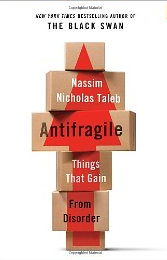
When moving out of my apartment after nearly 25 years became a clear option, I was at first amazed at how easily it presented itself. Then I realized it was preceded by many small signs of the value of a break in the pattern of my life: a talk at Town Hall by Nassim Nicholas Taleb on his concept of anti-fragile – “Some things benefit from shock, they thrive and grow when exposed to volatility, randomness, disorder, and stressors;” a determination in January by my writing group partner Sarah and me that 2013 would be a year of “clearing out;” Mary Ann’s observation that this phase of life is all about “editing;” finding thickly-crusted dust on protective pillow cases under the bed when preparing for an overnight visit by out-of-town friends; a comment from Cathryn, on hearing my complaint that it’s really hard to actually start clearing things out, “You won’t do it until you have to move;” visiting Anne and seeing how completely delighted she is with her new, much smaller home. And then there are the first lines of the piece I made for Scott’s Chamber Music exhibition at the Frye, “Get up, get up!/Let’s get going.”
Because of the age I am now, this editing is often called “downsizing,” which seems disheartening or depressing, a little too close to “downer.” I’d rather think of it as lightening up, gaining flexibility, maybe something closer to the “liberation” that author Dr. Gene Cohen attributed to this particular phase of life, a break when things open up, as in breakthrough. Actually, I’ve started referring to my pending move as “repotting.” Pull the plant out. Shake the dirt off. Trim the roots back to encourage new growth. And replant in new soil. Repotting may allow for new opportunities to engage with immediate friends and neighbors, civic affairs, the world of ideas, to be part of re-imagining a new role for older community members.
All this sounds good – positive, upbeat – and is definitely what I feel much of the time. But it’s also daunting and scary. It would be so easy not to. Or to say, golly, next year would be a whole lot easier. When I imagine not being in this apartment, I get wistful … the warm afternoon sun shining low through the summer foliage on my deck or the wonderful times I’ve had here with gatherings of friends. But too many things say now is the time. The next couple of months will be crucial.
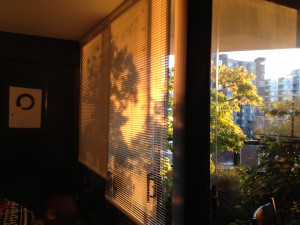
Then, about a week after returning from a lovely weeklong retreat in San Francisco where I cemented the decision for myself, I broke my leg.
Actually the orthopedist’s report called the break a “spiral fracture of the right fibula.” On a very pleasant Monday evening, Edie and I had headed out on the grassy terraced slopes by the Ballard Locks, picnic makings in hand. Apparently I wasn’t paying attention to just how steep the slopes were. I slipped, things went flying, and my ankle did things it simply wasn’t meant to do. We didn’t realize anything was broken because I was able to hobble out. Along with picnic supper in my living room, I learned about RICE – rest, ice, compression, and elevation – all the right things to do for a serious sprain.
Even so, after a sleepless night, I called the doctor. My upstairs neighbor Douglas had seen me hopping around on one leg, and when he learned I’d just made a doctor’s appointment, he (now saintly in my mind) said, “I bet you need a ride!” He proceeded to ferry me around from one doctor to the next, patiently sitting in waiting rooms, until he brought me home with my new pair of crutches and bright red cast. “Red goes with everything,” I’d told cast maker Michelle.
With a cast and crutches, everything takes longer. I learned new ways to do familiar things. Like how on crutches to get a cup of coffee from stove to table, water the plants, and keep a cast dry in the shower with a plastic bag and rubber bands. Carolyn gave me tips on going up and down stairs. I practiced on the eight steps from my building lobby to mail boxes before tackling stairs from the sidewalk to the front door of a friend’s home for a dinner party. Getting help from friends has been a big part of the solution. Gwen took me to get my toes repainted so they could feel happy when propped up, by doctor’s orders, in the middle of the room. Nice, but they longed to head out the door and walk somewhere, anywhere, fast!
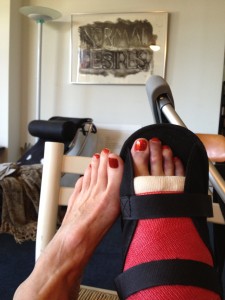
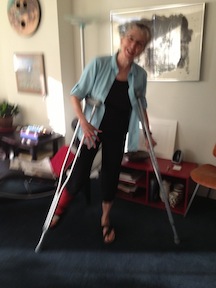
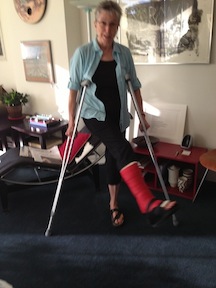
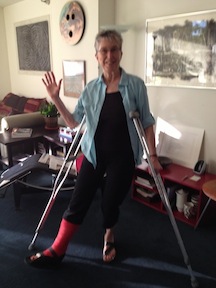
Given current research on the brain, I’m sure all this is creating new neurons. My leg may be broken but my brain is rejuvenating. I also figure the whole thing may just be fate’s gift of lessons for how to slow down and learn to ask for help. Both are hard to do.
Although this break tested my conviction to make the big break in where I live, plans for my move are gaining momentum. With help from family and friends, I’ll clear most of my stuff out of Harbour Heights by the end of August, pack things away in storage, and then live in a temporary home and work in a temporary office for a few months. Apparently, in today’s market it will be easier to sell than to buy. This schedule lets me do one thing at a time and may allow me to have a little patience as I look for the right place to plant myself next. Unless I’m really surprised, this won’t be my last move. It isn’t the one I and others have imagined, but it could certainly make another move easier.
In and around all the necessary tasks of packing and moving, selling and buying, keeping my work-for-pay going, and maintaining some sort of connection with friends, I’ll be pondering the meaning of breaks and shifts, repotting and liberation, editing back and imagining forward. For me, both conversation and writing change the ideas I start with and make them more real. I’ll be looking for chances to do both. Richard recently told me that decades ago I referred to most of the things I did, including my artwork, as “projects.” The word has always carried positive meanings for me. Some things don’t change much I guess. All this is definitely a project.
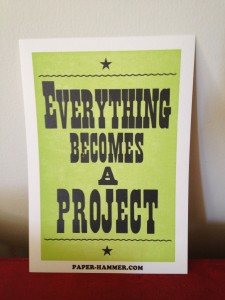
![]()
I like the idea of repotting. The look of the roots with all the dirt washed off is not in like a network of neurons. Some that I know all what we are not, not retired, but refocused.
I’ll bet you’ll enjoy reading about the impact of immigration on creativity and brain flexibility. I found this when the wrong paper was delivered one recent morning. It was the result of a good accident.
Eric Weiner on 1.15.2016 Wall Street Journal, “The Secret of Immigrant Genius”
http://www.wsj.com/articles/the-secret-of-immigrant-genius-1452875951